A Gay Inspiration: Get to Know Walterina Markova, a Comfort Gay of the 1940s
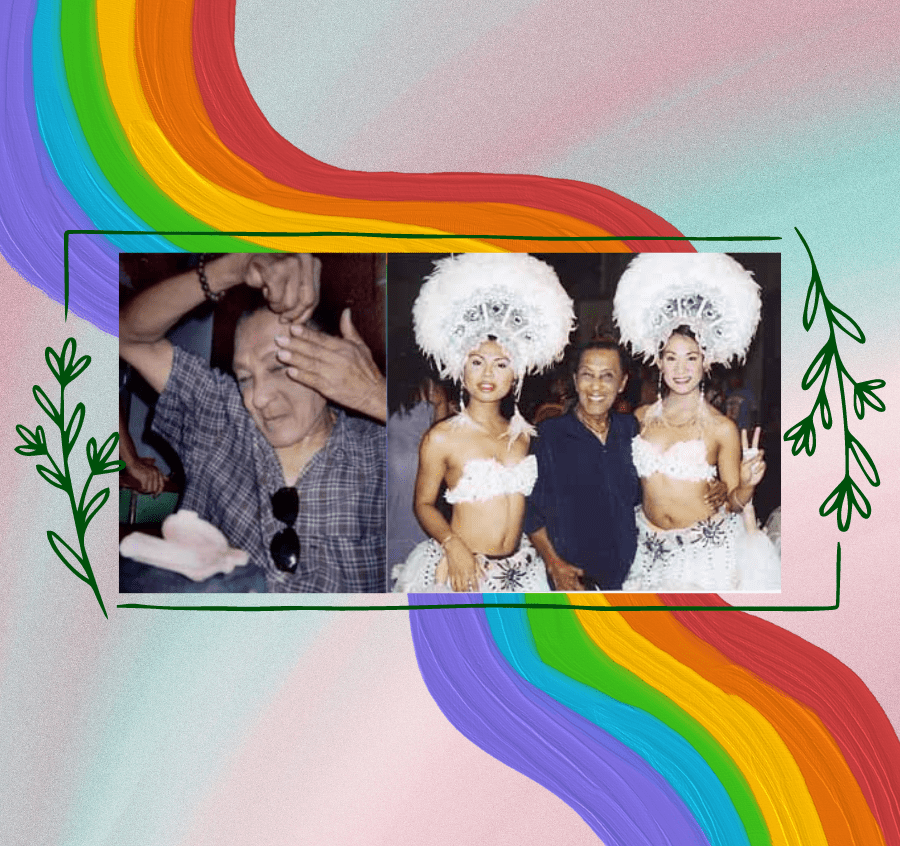
It’s been a long time since the Japanese attempted to occupy our country. Because of the atrocities done at the time, with Filipinos as the biggest victims, the Philippines suffered greatly. Walter Dempster Jr. (May 20, 1924 – June 24, 2005), also known by his alias Walterina Markova, was one of these Filipinos who are comfort gays of the Japanese soldiers, and his story is one of the chapters of those horrible days.
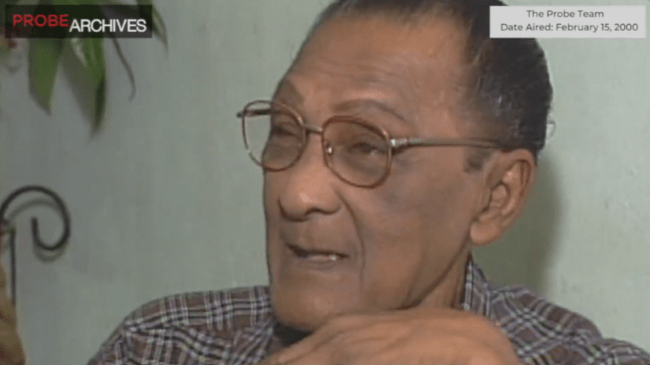
During the Japanese conquest of the Philippines in World War II, served as a “comfort gay” (sex slave) by force was Markova, a Filipino-Jamaican gay man for soldiers of the Imperial Japanese Army. At the time, homosexuality was regarded as a social taboo and a sin.
Unfortunately, at the age of 83, on June 24, 2005, a racing bike hit Markova, and never survived. Let’s look back on Markova’s life and how he came to serve as an inspiration for the LGBTQ+ community.
(Trigger Warning: Rape, violence)
Looking back at the story of Walterina Markova, a comfort gay of the 1940s
Before the war
In the 1930s, brutality had already marked Markova’s early years in Manila. Markova’s older brother Robert regularly tormented and mistreated him as a child. But after Robert’s death, Markova finally experienced freedom. Later, Markova joined a group of six cross-dressers who worked as stage performers. Without anyone noticing, he and his gay friends enjoyed cross-dressing.

Photo Credits: Intersections: Gender and Sexuality in Asia and the Pacific
Additionally, before the war, he performed a floorshow twice a week in Lonapor, Subic Bay, and Angeles Night Club. Because of the way he looked in his costume, the American Navy soldiers were unaware that he was gay. In fact, all of the Americans cheered him as he performed.
One American was once completely smitten with him. He wanted to live with him, but he didn’t like it because he wasn’t yet capable of acting like a woman. His buddies were trying to teach him how to be a lady at the time, but he just saw himself as gay and carefree. Though, he had to behave like a woman if he was at the table with a customer.
When the Japanese arrived
They were all in the streets of Pasay in January 1942 as the Japanese passed by, watching them. Even though there was a blackout that night, Markova don’t want to stay at home and instead went out flirting and searching for boys.

He claimed that when the Japanese arrived, he was still wearing women’s clothing, but it was difficult to walk around the city. Also, the Japanese warned them that if they made an improper or sloppy bow, they would slap or kick them. Meanwhile, he continued dancing in Manila bars during the Japanese Occupation. He even gave performances for Japanese customers which were unaware that he was gay.
Becoming a comfort gay
When they were in the club one night, there were no customers there. So, one of his friends suggests going for a walk. Four of them set off while all wearing women’s clothing. During the time that Markova and his friends were led inside the Japanese soldiers’ rooms at the Manila Hotel, the Japanese soldiers initially mistook them for ladies.
Because of their “deception”, the Japanese brutally kicked them while on their way to the camp, now known as the Rizal Memorial Sports Complex. They were then taken inside to their quarters. The Japanese lined up one by one and began to rape them. They were helpless since there were Japanese soldiers all around them. As they were being raped, they were hitting them everywhere. Markova was 18 at that time.
Moreover, the Japanese ordered the detention of every drag queen performer. as punishment for their “deception.” They brought in more LGBTQ+ people to the camp, turned into comfort drag queens, and subjected to far more violent rapes than comfort women.
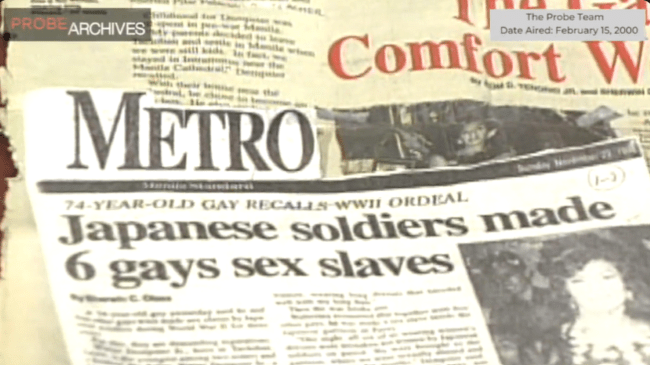
Forced labor
Additionally, the four of them were subjected to forced labor. They would wash the soldiers’ uniforms in the morning, shine their combat boots, and then clean their barracks. Also, they had to trim the grass in front of Manila City Hall under the sunlight. At the time, they were similar to prisoners. They slept on the concrete, up against a wall, in a chair, and even on the floor once or twice. They didn’t provide them with anything comfortable to lay on.
He claimed that despite their extensive “service” and other labor, they usually received simply lugaw as food (rice porridge). While in Japanese custody, Markova witnessed the soldiers almost every day raiding communities. Detained individuals would have their hands tied before being killed. However, the murder of infants truly horrified Markova. Due to these awful occurrences, Markova lived every day as if it were his last. However, he had not given up on his desire to regain his freedom.
‘Free’ from violence
They spent over two weeks there, the four of them. Twenty Japanese soldiers raped them every day. They were barely able to stand up or sit down, he claimed. Their other friend managed to escape, leaving the three of them behind.
The three of them were transported and loaded onto a Japanese truck at about midnight. They had no idea where they were going, and they were afraid the Japanese would kill them. The truck then came to a stop, the engine might have encountered an issue. They were parked in EDSA, which was previously an open area with simply rice fields and cogon as there are no buildings. After all the Japanese got down from the truck, the three of them held hands as they jumped off the vehicle. Because of engine issues with their truck, the Japanese were unable to follow them.
Markova eventually found himself alone to tell this story after learning later that his other two gay friends had been killed in a raid just before the Japanese occupation ended. Years after the war was over, he found himself giving up cross-dressing and starting a new career as a makeup artist for the film industry.
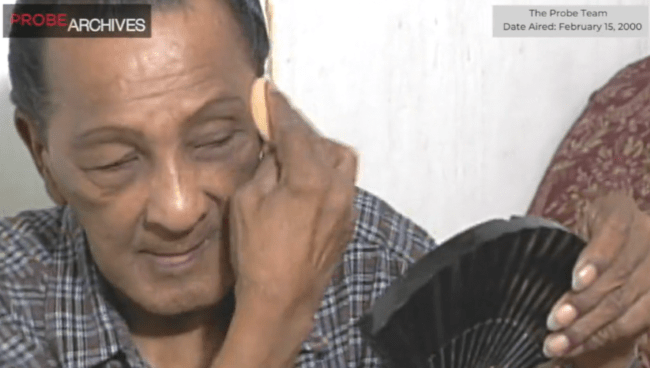
He would spend the night in the Home for the Golden Gays in Pasay City, where other senior gay men who had experienced discrimination also seek refuge. He also started working part-time as a trainer for young Filipinas seeking work as exotic dancers in Japan.
The aftermath
Markova never imagined that his story, which had already been published in print and on television, would someday be made into a movie in the year 2000. His life is shown in much more by none other than Dolphy, the king of comedy in movies. The 26th San Francisco International Lesbian and Gay Film Festival screened the 97-minute film as well as the 2002 Seattle Lesbian and Gay Film Festival.
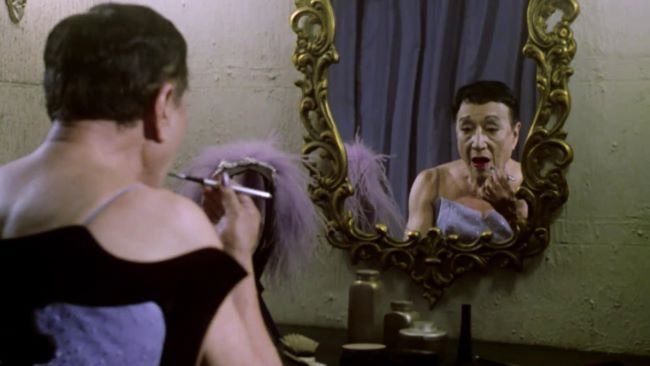
Photo Credits: IMDb
The movie revealed a long-forgotten LGBT historical chapter. Despite having a single man’s story as its focal point, it has a very broad span. It depicted the story of a country’s fight for independence as well as its own internal conflicts with intolerance, conformity, and expectation.

As humans, we won’t live long. Revealing my own story is my way of inspiring other gays who continue to be oppressed today. By my act, I may have probably given the freedom to many other gay people.
Markova said during an interview.
When Markova was still alive, he lived his life authentically. He and his friends went through many hardships that no one could have ever imagined, yet he never gave up and instead carried on with his life. While he would have been subjected to atrocities by the Japanese for being gay and simply being himself at the time, queers and trans people at the present time have to deal with prejudice from society. But like Markova, we should just be ourselves and be carefree despite prejudices. It’s not our responsibility to adopt their beliefs.





